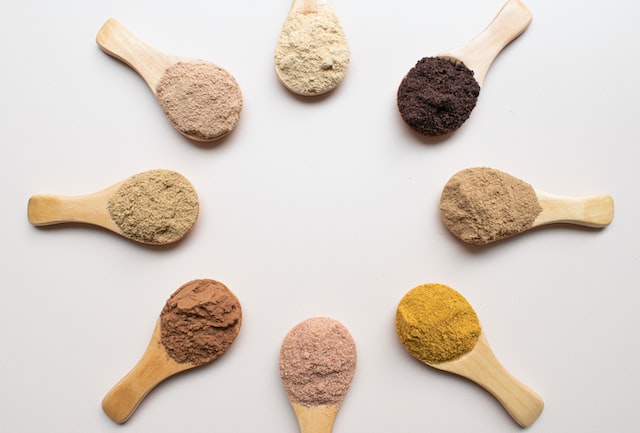Protein is a vital building block for a strong and healthy body. Protein is essential for several body processes, including building muscle, maintaining muscle health, and adding volume to skin and hair. However, for those just starting out on a plant-based diet, it can seem like an uphill battle to find sources of exclusively plant-based protein.
It turns out that nature provides a wealth of protein-rich, healthful, and potent plant-based options. plant based protein are just as effective as those derived from animals, and they also provide a number of other health benefits, thanks to their high content of vitamins, minerals, and nutrients including polyphenols, antioxidants, and flavonoids. There is a wide array of plant-based sources available to meet your protein demands and dietary preferences.
Therefore, let’s get our plant-based protein going with one of the 10 powder options that are listed below!
1. Pea Protein
At present, pea protein is extremely popular. It’s relatively new, but already among the most potent protein sources available. Protein from yellow peas is extracted to create pea protein, also known as pea protein isolate.
In addition to being one of the more readily digestible plant proteins, the fact that it is “naturally vegan and hypoallergenic,” an excellent supply of iron something that can be lacking for plant-based eaters, and a wonderful amount of protein.
What advantages do you derive from consuming pea protein? The quality of the pea protein you use makes a huge difference. Vegan Way 100% Vegan plant protein Powder has 25 grams of protein, 0% cholesterol, 0.61 grams of fat, and 0 grams of sugar per serving.
2. Brown Rice Protein
One cup of cooked medium-grain brown rice includes 4.5 grams of protein, 3.5 grams of dietary fiber, 1.6 grams of fat, and a plethora of vitamins and minerals, most notably niacin, vitamin B6, folate, calcium, magnesium, phosphorus, and potassium. Brown rice is a fantastic gluten-free alternative when looking for a protein powder to use.

3. Hemp Protein
Among the many plant-based proteins available, hemp protein has recently emerged as a crowd favorite. Protein from hemp is obtained by crushing crushed hemp seeds into a fine powder.
Hemp, like pea protein, provides a complete protein with all nine essential amino acids and is suitable for vegans. Hemp protein is a popular alternative to pea protein, which has been described as tasting “earthy” and “nutty.”
It’s worth noting that this protein choice also has more than a few other nutrients that may be significant to some people: fiber, healthy fats, and certain minerals.
4. Lentil Protein
Even though they are one of the best plant-based sources of protein, lentils haven’t yet made it to the exclusive plant-based protein powder market. About 49 grams of protein, 58 grams of fiber, 2 grams of fat, and 14 milligrams of iron may be found in a cup of lentils. While many people use these legumes for meatless meals, they can also be used to increase the protein level of a pre- or post-workout smoothie.
5. Chickpea Protein
Chickpeas, like lentils, aren’t exactly a household name when it comes to protein powders. Even if these beans aren’t often consumed, it doesn’t mean you can’t benefit from their high protein and nutrient content. Chickpeas are an excellent source of protein, in addition to being high in fiber and nutrient-dense.
However, it is vital to remember that chickpeas do not supply a complete protein because they lack two of the nine essential amino acids. One cup of cooked chickpeas provides 14.5 grams of protein, 12.5 grams of fiber, 4.2 grams of fat, and 4.7 grams of iron when eaten in their natural state.
6. Chia Seeds
In the realm of vegetarian and vegan diets, chia is a well-known and widely-appreciated powerhouse of protein and fiber. Chia seeds are not only an excellent source of complete proteins and fiber, but they are also an excellent supply of heart-protective omega-3 fatty acids, as well as a healthy fat, and they contain a very small amount of sugar.
7. Spirulina Protein
Spirulina is a relatively recent find in the realm of plant-based foods. This nutrient-rich emerald powder originates from a blue-green algae. The nutritional benefits of spirulina have made it famous as a “superfood,” but its high antioxidant and anti-inflammatory content have also made it a popular component in many vegan cosmetic products.
Also, spirulina is a great way to get protein. While spirulina powder is a terrific way to get protein, it’s not nearly as good when it comes to meeting your daily fiber requirements.
8. Pumpkin Seed
Seeds are among the most potent sources of important macronutrients, vitamins, and minerals in the plant-based kingdom, but they get little credit for their importance. The protein content of pumpkin seeds is exceptionally high, and they also provide a variety of other benefits.
Nutritionally speaking, a single cup of roasted kernels is packed with a wide variety of vitamins and minerals, including A, C, K, B6, niacin, folate, choline, calcium, magnesium, phosphorus, potassium, zinc, and selenium.
9. Sunflower Seed
If you’re not into pumpkin seeds but still want your daily dosage of protein, consider sunflower seeds instead. Seeds are a fantastic plant-based source of protein and also include beneficial fats, such as monounsaturated, polyunsaturated, and omega fatty acids.
There are 9.6 grams of protein, 4 grams of fiber, 23.7 grams of fat, and 2.5 milligrams of iron in one cup of dried sunflower seed kernels.
Besides the essentials for a healthy plant-based diet, such as protein, fiber, fat, and iron, sunflower seed protein also provides a wealth of additional vitamins and minerals, such as A, C, E, and B6, as well as niacin, folate, choline, calcium, magnesium, phosphorus, potassium, zinc, and selenium.
10. Soy Protein
Protein powder like soy protein isolate are manufactured by first extracting the protein from “defatted soybean flakes,” which are then washed in alcohol or water to remove carbohydrates and dietary fiber, before being dehydrated and powdered into a fine powder.
There is a lot of back and forth about how healthy soy products are, but the powder form has some benefits that others don’t. For example, it has almost no fat and no cholesterol, and it also has minerals like iron, phosphorus, copper, and manganese.
Author Bio:
I am Meera Sharma, a post-graduate in Health and Nutrition, and an inquisitive person who loves writing.


